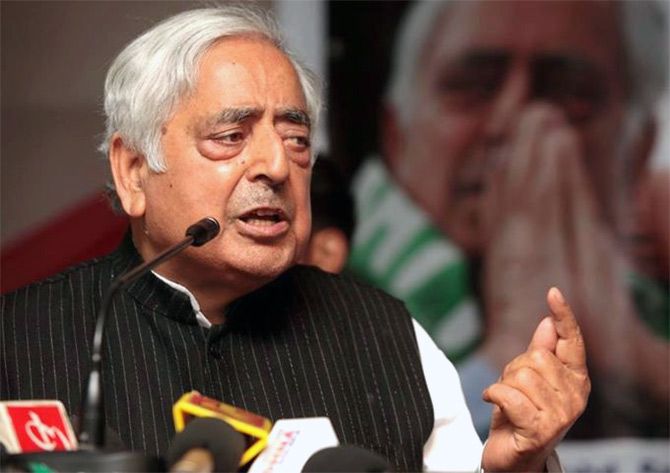 Peoples Democratic Party patron Mufti Mohammed Sayeed will meet Prime Minister Narendra Modi for the first time on February 27 after which a swearing-in ceremony is likely to be held on March 1, two months after the results for the Jammu and Kashmir Assembly polls were announced.
Peoples Democratic Party patron Mufti Mohammed Sayeed will meet Prime Minister Narendra Modi for the first time on February 27 after which a swearing-in ceremony is likely to be held on March 1, two months after the results for the Jammu and Kashmir Assembly polls were announced.
79-year-old Sayeed's meeting with Modi is expected to be a mere photo opportunity as all the issues between the two parties have been sorted out and a "comprehensive document" for governance has been framed.
Though March 1, considered as an 'auspicious day', is being favoured by both the parties for the swearing-in in Jammu, PDP chief spokesman Naeem Akhtar said "a final decision on oath taking will be taken only after the meeting between the PDP patron and the Prime Minister".
During the meeting, Sayeed is expected to invite Modi for the swearing-in function. This is for the first time that the Bharatiya Janata Party will be part of the ruling benches in the state.
Ahead of the meeting between Sayeed and Modi, both the parties are likely to meet on Thursday for finalisation of the cabinet. While Sayeed will be the Chief Minister for a complete term of six years, Nirmal Singh from BJP is expected to be the Deputy Chief Minister having the portfolio of Planning.
Sayeed will be holding the portfolio of Home and newly elected PDP MLA Haseeb Drabu may be the new finance minister.
Presidents of both the parties -- Mehbooba Mufti of PDP and Amit Shah of BJP, met in New Delhi on Tuesday after which they announced formation of a coalition government in the state.
Shah tweeted after the meeting that "glory will be restored in the 'Jewel of the Crown’; BJP-PDP Govt will take Jammu and Kashmir to new heights by ensuring Good Governance and Development."
The December 23 election results saw a highly-fractured mandate with PDP emerging as single largest party with 28 MLAs followed by BJP with 25. Erstwhile allies National Conference and Congress ended with 15 and 12 seats respectively.
BJP and PDP, which have been in negotiations for nearly two months now, have ironed out all the differences over contentious issues including Article 370, Armed Forces Special Powers Act, resettlement of West Pakistan Refugees and holding talks with Pakistan and separatist leaders of the state.
The document prepared by the two sides mainly focuses on development and providing job opportunities to youths.
“We may not call it a Common Minimum Programme but a comprehensive document which is aimed only at all-round development of the state in every aspect. We need minimum of three years and a maximum of six to finish the agenda that has been set up by both the parties,” a leader who was involved in the negotiations said.
He said “its a win-win situation” for both the parties.
The document also lists ways and means for rehabilitation of nearly 60,000 Kashmiri Pandit families who had left the KashmirValley after the onset of militancy in early 1990s.
On Article 370, while BJP has given no written assurance as demanded by PDP, the document is expected to say that both parties will respect the aspirations of the people of the state within the Constitution, the sources indicated.
The proposed document may also touch upon the issue of more than 25,000 families of West Pakistani refugees by terming it a humanitarian issue.
The other issues include handing over of hydel projects to the state government and vacating of land and buildings by the army in the valley.











 © 2025
© 2025